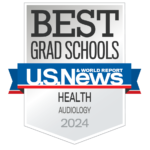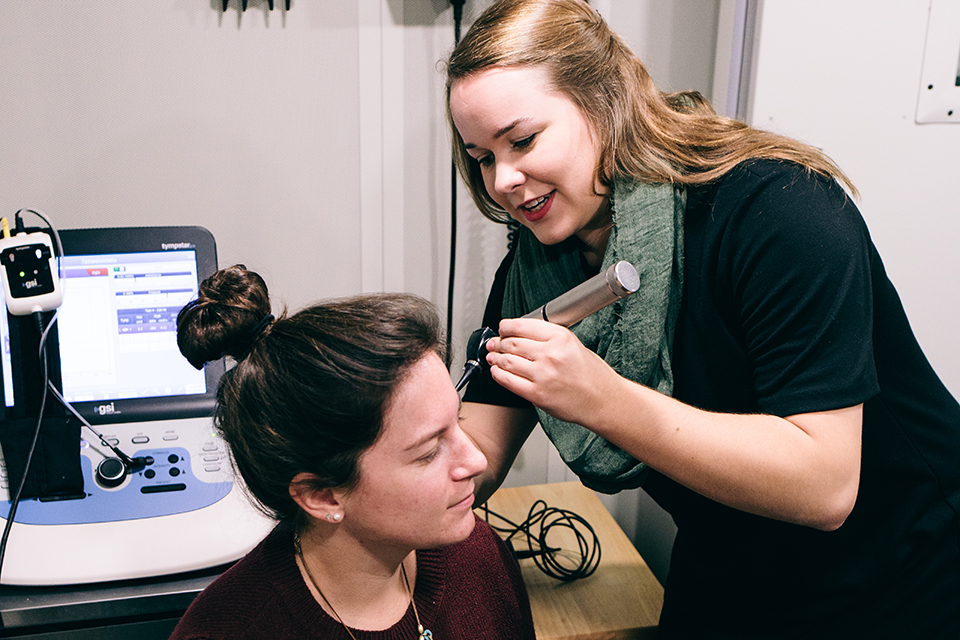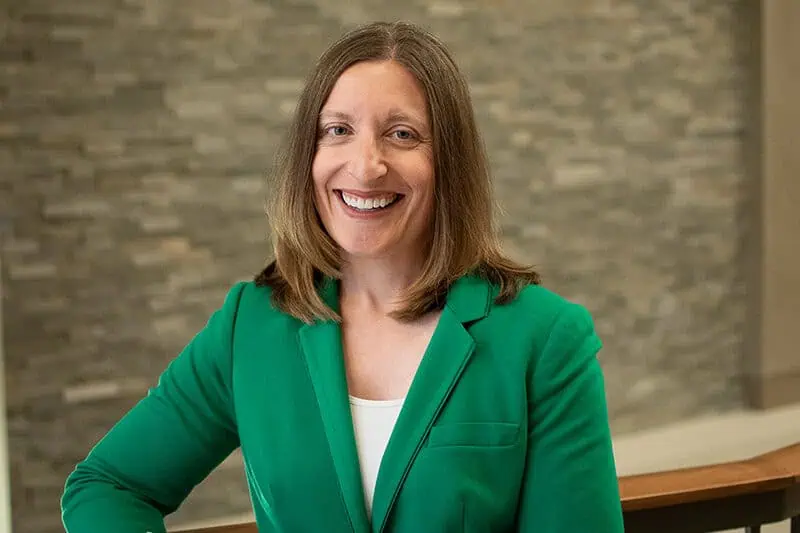
Ranked No. 5 by U.S. News & World Report, highest ranked program in Indiana
The Doctor of Audiology (AuD) program provides you with a solid foundation in the science of hearing and the skills to conduct and promote evidence-based clinical practice in a culturally sensitive manner. You will learn to apply these skills in a wide variety of clinical settings, through a combination of academic and clinical education and research participation.
The Doctor of Audiology (Au.D.) education program in audiology (residential) at Purdue University is accredited by the Council on Academic Accreditation in Audiology and Speech-Language Pathology of the American Speech-Language-Hearing Association, 2200 Research Boulevard #310, Rockville, Maryland, 20850, 800-498-2071 or 301-296-5700.
Student Outcome Data Audiology Courses OfferedProgram Highlights
- The AuD program’s high-quality clinical education addresses the full scope of practice in audiology through hands-on experience in the Purdue University M.D. Steer Audiology Clinic. You will work under the direct supervision of clinical faculty members to gain experience providing diagnostic and rehabilitative audiology services to the community.
Program Quick Facts
Degree Type:
Doctoral (AuD)
Program Length:
4 years
Location:
West Lafayette, IN
Department/School:
Department of Speech, Language, and Hearing Sciences
Admissions/Requirements
Applications for admission to our clinical programs (AuD, MS-SLP) require materials to be sent both via the Centralized Application Service for Communication Science & Disorders (CSDCAS) and via Purdue’s online systems.
Application Materials to Be Submitted to CSDCAS
All applications & materials must be submitted no later than 11:59 pm on January 15. To be considered for admission, your application should be marked as “complete” or “verified” by CSDCAS before this time.
Material to be submitted to CSDCAS:
- Application submitted and fee paid
- Official transcripts received from all universities granting any credit
- Official evaluations of any international transcripts, that are not originally in English and/or do not follow the 4.0 GPA scale
- Three letters of recommendation*
- CV or resume. Please be sure to include relevant experience in the areas of leadership, collaboration, critical thinking and community advocacy.
- Essay #1: Academic Statement of Purpose (required)***
Please follow the prompt in the CSDCAS application. See the “Essay Guide” here for instructions on writing your essay. - Essay #2: Personal History Statement (required)***
Please follow the prompt in the CSDCAS application. See the “Essay Guide” here for instructions on writing your essay. - Other Optional Essay (optional)
See the “Essay Guide” here for instructions on writing your essay. (Please note CSDCAS lists this as optional but it is actually required). - Video response to question prompt.
- English proficiency test scores are required of all international applicants whose first language is not English. See more details about requirement in the section, “Applications for International Students”.
Please note: Any application not marked complete in CSDCAS by 8:00 am EST on January 16, 2025, will be marked incomplete and will not be reviewed for admission consideration.
*You will not be penalized if the recommendations you requested are not received by the deadline date.
Please contact the slhsgradsec@purdue.edu with any questions.
CSDCAS Application Essay GuideApplications Materials to Be Submitted to Purdue University
Your application to Purdue University will be made through the Purdue Office of the Vice Provost for Graduate Students and Postdoctoral Students. (OGSPS)
- Application submitted and fee paid (Click here for the Purdue Graduate Application)
- Copies of official transcripts as directed by the Purdue Office of the Vice Provost for Graduate Students and Postdoctoral Scholars (OGSPS).
- For those whose first language is not English, official English proficiency test scores less than 2 years old
- CV or resume
- Essay #1: Academic Statement of Purpose.
Use your CSDCAS “Personal Essay” for this required document. See the “Essay Guide” here for instructions on writing your essay. - Essay #2: Personal History Statement.
Use your CSDCAS “Other Additional Essay” for this required document. See the “Essay Guide” here for instructions on writing your essay. - English proficiency test scores are required of all international applicants whose first language is not English. See more details about requirement in the section, “Applications for International Students”.
Any questions you have can be directed to the SLHS Graduate Program Coordinator at slhsgradsec@purdue.edu.
Essay GuideAuD Clinical Program Requisites
You may take these courses before or during the graduate program. Taking these courses during the program creates a heavier course load; if possible, you are encouraged to complete these courses prior to beginning the graduate program.
- 1 course in biological science (focus on animal or human biology)
- 1 course in physical sciences (focus on chemistry or physics)
- 1 course in behavioral/social sciences
- 1 course in statistics (An inferential statistics course covering t-tests, analyses of variance, chi-square, regression and correlation. A course syllabus may be requested to confirm course content.)
AP transfer credit for biological, physical and social sciences can only be used if the original scores meet Purdue minimums. AP credit cannot be used to meet the statistics requirement.
Applications for International Students
Please note, the Department of Speech, Language, and Hearing Sciences (SLHS) has higher minimum requirements for English language proficiency for a clinical degree than the Purdue University Graduate School. Also, SLHS does not waive this requirement, even if you have earned a degree within the past 24 months from an institution where English is the primary language of instruction.
To be eligible for admission into the clinical programs or to be eligible for departmental funding as a PhD student (unless other arrangements are made with the students’ PhD supervisor), all international applicants must meet the higher department standards.
English proficiency test scores are required of all international applicants whose first language is not English.
TOEFL Ibt: A minimum total score of 100 with minimum individual scores of 28 for speaking; 22 for writing; 22 for listening; and 22 for reading.
IELTS: A minimum score of 7.5 with no single band score lower than 7.0. International transcripts must be uploaded or submitted in their original form and in translation, along with copies of any diplomas awarded. Please send any paper transcripts to the SLHS Graduate Program Coordinator at slhsgradsec@purdue.edu.
Dual-Track Degree Program
Eligible students may pursue a combined clinical and research dual-track degree program to pursue both a master’s and doctoral degree. You will typically start with coursework in the AuD clinical program while simultaneously beginning to participate in research. Completion of the clinical degree usually precedes advancement to candidacy in the doctoral program, but a proportion of required hours of clinical supervision within the clinical degree may be satisfied through appropriately supervised research activities.
Research
The AuD program prepares you to become grounded in experimental research into auditory processes in normal-hearing and hearing-impaired individuals. By participating in research, you will have opportunities to work alongside faculty to investigate solutions to hearing- and balance-related challenges and disorders.

Research Opportunities
- Computational modeling
- Hidden hearing loss
- Neurophysiology and electrophysiology
- Psychophysics
- Speech perception
Research Areas
- Hearing science
- Hearing disorders
Research Facilities
- Auditory Cognitive Neuroscience Lab
- Auditory Electrophysiology Lab
- Auditory Neurophysiology and Modeling Lab
- Psychoacoustics Lab
- Research in the Experimental Amplification Research Lab
- Speech Perception and Cognitive Effort Lab
- Systems Neuroscience of Auditory Perception Lab

Program Director
Shannon M. Van Hyfte, Au.D., CCC-A, is a Clinical Professor in the department of speech, language, and hearing sciences at Purdue University.